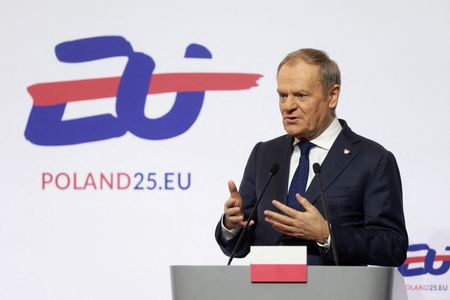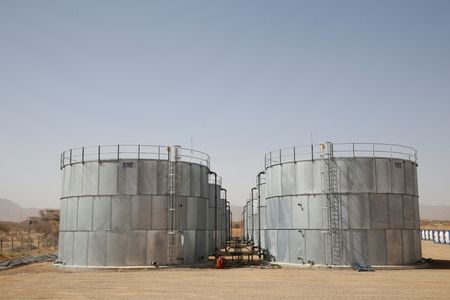By Barbara Erling and Marek Strzelecki
WARSAW (Reuters) – Poland is likely to see total investment of more than 650 billion zlotys ($160 billion) in 2025, Prime Minister Donald Tusk said on Monday, as the government unveiled a package of measures including tax cuts and deregulation to spur growth.
The economy has been one of Europe’s fastest growing in recent years, driven largely by private consumption on the back of double-digit wage growth in a tight labour market. But analysts say investment has been a weakness for the country as it tries to catch up with wealthier western European nations.
“Investment in Poland in 2025 will amount to over 650 billion zlotys,” Tusk told a news conference at the Warsaw Stock Exchange. “This amount has never been seen in the history of the Polish economy.”
Tusk said investments would be made in sectors such as defence, green energy, information technology and transport infrastructure, including 180 billion zlotys spent on the rail network by 2032.
He said the head of tech giants Google and Microsoft would be in Poland in a few days to finalise plans to invest in the country.
Economic growth in Poland in 2025 could be close to 4%, Tusk added.
Tusk said he had asked Rafal Brzoska, chief executive of parcel locker company InPost, to help prepare measures to cut red tape.
TAX
Lawmakers from the nationalist Law and Justice (PiS) party were unimpressed, with Member of the European Parliament Michal Dworczyk dismissing Tusk’s speech as “waffle without any specifics”.
Mariusz Zielonka, chief economist at business association Lewiatan, said the amount of investment projected for 2025 “does not differ from what the state and investors spend in Poland every year”, adding that few specifics had been given.
Finance Minister Andrzej Domanski said Poland would boost its spending on research and technology, as well as on developing ports and railways and would work to support business as it seeks to build “a strong, dynamic, but also safe economy – an economy resistant to external shocks.”
He said Poland would raise a limit on VAT exemptions for companies and cut the amount of money collected in a tax on copper production by 500 million zlotys in 2026 and 700 million zlotys in 2027. This announcement sent shares in mining company KGHM surging as much as 9% higher on the day.
Domanski later said that the copper tax cut could be extended beyond 2027.
Rafal Benecki, chief economist at ING in Poland, said he saw signs of “change of the paradigm in terms of the attitude to business”.
“We are starting this process of changing the growth model,” he said, adding that Poland in the past had been too reliant on cheap labour.
($1 = 4.0523 zlotys)
(Reporting by Barbara Erling, Marek Strzelecki, Anna Koper, writing by Alan Charlish; Editing by Aidan Lewis and Toby Chopra)










